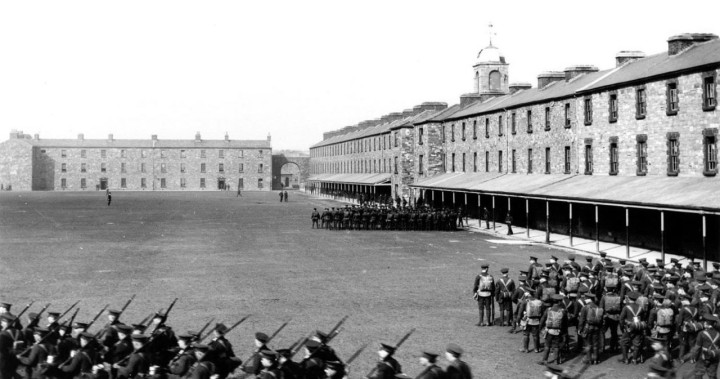


Richmond Barracks is delighted to welcome historian Donal Fallon to write a series of blog posts about the building and its rich history.
Today, Donal considers one Irish man’s unique story.
P.J. Paul, Officer Commanding the East Waterford Brigade of the IRA in the War of Independence, lived a remarkable life. His story encompasses Richmond Barracks, where he was based as a British soldier, before the transformation of his life led him to play a leading role in the revolution in his native county.
In his statement to the Bureau of Military History, P.J. Paul recounted:
"I was brought up in an entirely Irish atmosphere because my forbearers on both sides had suffered the loss of their property in previous generations and, therefore, the feelings of my parents and grandparents, which I absorbed as I grew up, were against the English rule that had been responsible for the loss of the family fortunes"
Despite the strong nationalist convictions of his family, Paul joined the British Army on the outbreak of World War One, convinced as many young Irishmen were that they were doing a patriotic service to Ireland in such actions, as the conclusion of the war would lead to Home Rule. Waterford was strongly loyal to John Redmond and the Home Rule tradition, and of Redmond’s influence in the county, P.J. recalled “he was very popular there, so that what he said about such matters, that is, public statements of policy, were accepted without question by practically everyone in the constituency.”
Enlisting in the Royal Irish Regiment in Waterford, P.J. was sent to Dublin to undergo training, first in Beggars’ Bush Barracks and later here at the Richmond Barracks. He recalled being called up from here, and how “my Regiment joined an expedition intended originally for Gallipoli but which, in fact, landed in Salonika in Greece. The Austrians had overrun Servia at this stage and our Division, with some French troops, were sent up to stem the tide.”
While serving with the British Army in Greece, P.J. first heard news of the insurrection in Dublin. In this regard, he was not unlike the famed IRA commander Tom Barry of West Cork, who heard of the insurrection for the first time as a British soldier in modern-day Iraq, and was baffled by the reports. P.J. however recalled:
"Most of the men were men who, like myself, had joined up for the duration of the war and in the belief that they were serving Ireland by doing so, and so their sympathies were entirely Irish and swung towards the Insurrection in Dublin, or the Rebels as they were called, as soon as we learned of the Insurrection"
Little was P.J to know that the very barracks in which he had been based in Dublin was being utilised to house suspected rebels.
For P.J., the journey home would be slow. He recounted “I did not see Ireland again until 1918, and then only for a short leave spell. My regiment had gone from Salonica to Egypt and Palestine, and from that to France and Belgium, and it was from France that I obtained my first leave home.”
The Ireland that he returned to was in the midst of a political transformation, and P.J. enlisted in the ranks of the Irish Volunteers.
P.J.’s Bureau statement not only details the War of Independence in his native Waterford, but includes many interesting references to his relationship with IRA leadership in Dublin. He recalled a visit to the National University of Ireland in May 1921, where Richard Mulcahy was based, and where he met two visiting Irish-Americans who had with them something very significant: “I was shown a specimen of the Thompson sub-machine guns which I learned were being smuggled in from America in some quantities. The two Americans were the experts on the gun and they demonstrated how it worked and explained its mechanism.” The Republican movement would be among the first in the world to lay hands on the ‘Tommy Gun’, though unfortunately for them it would come too late in their conflict to make any significant impact.
P.J.’s statement acknowledged the importance of non-combatants to the War of Independence, noting that “the railway was almost our sole means of communication with G.H.Q. and we relied upon engine drivers, guards, checkers and porters to bring couriers and messages to and from Dublin and sometimes material such as bombs and ammunition, which they did largely at the risk of their lives… I would also like to pay my tribute to the people who housed the Column, wounded and men on the run from time to time, always at serious inconvenience to themselves and often at very great risk. Were it not for the cheerful co-operation of such people, it would have been difficult for the Columns to operate.”
Paul supported the Anglo-Irish Treaty and enlisted in the Free State army. His statement to the Bureau is among the most detailed provided to it, giving vivid accounts of the revolution from the point of view of a former Richmond Barracks soldier.
Donal Fallon is a historian, broadcaster and curator from Dublin. Formerly Historian in Residence to Dublin City Council, he is the author of numerous studies of twentieth century Dublin, including The Pillar: The Life and Afterlife of the Nelson Pillar (New Island, 2013). He produces the Three Castles Burning podcast and has contributed to publications including Jacobin, Dublin Historical Review, Saothar and The Irish Times. He is a graduate of Maynooth University, University College Dublin and the Ulster University, and lectures with the Lifelong Learning department of University College Dublin.
Posted 04 June 2020
Tagged with: News